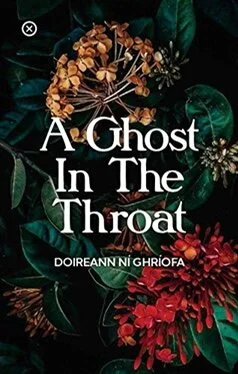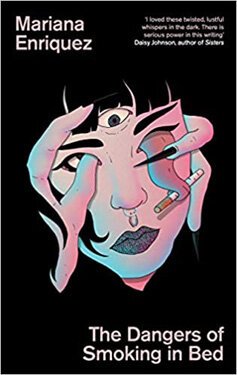It may seem perverse to read an apocalyptic novel when we've spent the past year living through a pandemic. I can certainly understand the hesitancy to engage in a fictional crisis when there's so much in reality to make us anxious or angry or mournful about what we've so recently lost. Yet, I think it's ingenious the way Jessie Greengrass has written about an environmental disaster which floods the country and leaves a small group of people subsisting on a small plot of elevated land. This story reassuringly solidifies the physical world at a time when our minds are consumed with calamity. When you're in a moment of deep distress it's common for someone to calmingly say to you “there, there.” To be reassured that “you are there” when feeling trapped in an interminable limbo is a precious comfort. Similarly, reading the accounts of three individuals recalling the events which brought them to this house and the stark nature of their meagre living energetically brings us back to the present moment.
Francesca is a world-renowned environmental scientist and activist who sees with alarming clarity that there will be a widespread disaster due to climate change. This has been highlighted by scientists and the media so often that it doesn't need to be explained in the narrative. The difference in this story is that Francesca knows it will occur sooner than we thought possible or were willing to admit so she makes provisions in a house she inherited and its surrounding farmland to prepare for this crisis. Unlike most survivalists, she does this not to save herself but her young son and his older step sister. She also arranges for a local young woman and her grandfather to live in this sanctuary to help maintain it. The fact of this cataclysmic event is inevitable from the start of the novel, but what Greengrass presents so meaningfully is the journey of how Caro and her brother Pauly and Sally and her grandfather (who is nicknamed Grandy) arrive at this place. Just because we know what has happened and where they will end up doesn't decrease the spellbinding tension of their flight or their sober realisation of the large-scale devastation.
There's a pared down simplicity to this story which enhances its effectiveness. From the characters' actions to their dialogue there doesn't need to be any philosophical speeches, whimsical descriptions or melodramatic flourishes because what they are dealing with is the stark reality of tragic situation. For instance, the question of survivor's guilt is presented rhetorically: “What option is there, in the end, for those few of us who have survived, but to be the unforgivable, and the unforgiven? All those who might have lived instead of us are gone, or they are starving, while we stay on here at the high house, pulling potatoes from soft earth.” The unstated emotions of sorrow, doubt, grief and existential crisis are all here beneath the surface of the immediate necessary action of pulling potatoes from the soft earth so that they may continue to eat and live.
I found it especially poignant the way that salvaged objects, the things they grow and the stored supplies are enumerated because we know their importance in this strained new reality. Equally, we strongly feel the longing for objects that were taken for granted and have now been lost when Caro recalls a half-consumed chocolate pastry or the forgotten scissors which would have made cutting her brother's hair so much easier. These present and absent objects are what bring Greengrass' story into such sharp focus. It's akin to how Virginia Woolf described the power of “Robinson Crusoe”: “by means of telling the truth undeviatingly as it appears to him – by being a great artist and forgoing this and daring that in order to give effect to his prime quality, a sense of reality – he comes in the end to make common actions dignified and common objects beautiful. To dig, to bake, to plant, to build – how serious these simple occupations are; hatchets, scissors, logs, axes – how beautiful these simple objects become.” In the specificity of these realistic details the world of Greengrass' characters with all their attendant emotions arise fully formed in the reader's imagination. Thus we come to better appreciate what we have and take for granted.
Greengrass has previously imagined what effect widespread disaster would have upon an individual in her fiction. In her collection “An Account of the Decline of the Great Auk, According to One Who Saw it” there is a story called 'Some Kind of Safety' in which a narrator is trapped in a bunker with a dwindling food supply. It's unsurprising that an author prone to testing out philosophical concerns should fictionally conjure scenarios where individuals are cut off from the wider society to arrive at a place that allows deep contemplation. What's admirable about this novel is the way no special insight about humanity or the cycle of nature is achieved from arriving at this state. The grandfather simply states: “All I can think is that what's different now is that no one can claim this is progress.” Nor does it prompt the characters to lyrically describe the ruins of the world that's left. Rather, it simply gives them a perspective about the true value of the things they have and the agency they possess to support each other and continue to survive.
If you follow the news for any length of time it's difficult not to feel an imminent threat of crisis and thus we often bear the weight of the world's problems on our shoulders. Of course, we watch the news because we want to be informed, but like the characters in the novel we can be left wondering “what difference did my knowledge make?” Lucy Ellmann voluminously documented this condition in her lengthy novel “Ducks, Newburyport”. Where Ellmann skilfully captured this mental state, Greengrass has encapsulated the dignity of our individual actions and the true value of what we possess. In the past year we've become all too aware of the potential lack of the things we take for granted because the merest hint of scarcity sends us all racing to the shops to stock up on toilet paper. Equally we now know what it means to be physically removed from a collective and many of us have felt intense loneliness and isolation while being in lockdown. Like the characters in the novel we've run the risk of losing “that sense of being a small part of a whole which persisted, even when we might dislike everything about it.” So reading about characters forced into a state of self-reliance when the larger world is drowning around them gives a strange sort of comfort. It connects us to humanity and makes us grateful for what we still have and what we have to lose.




















